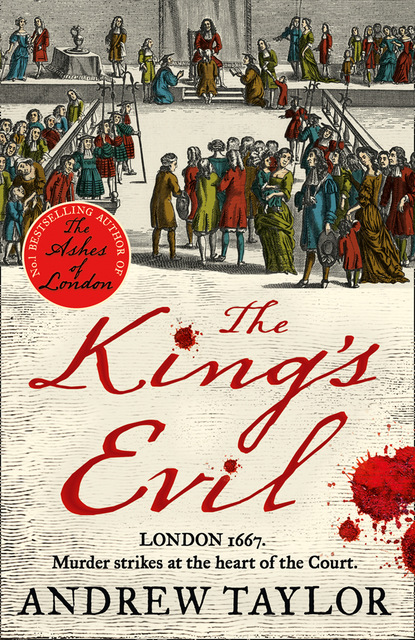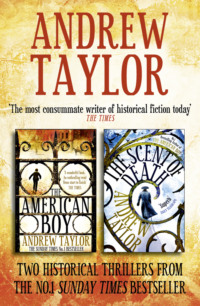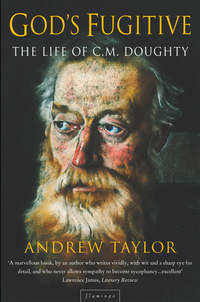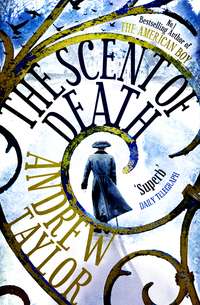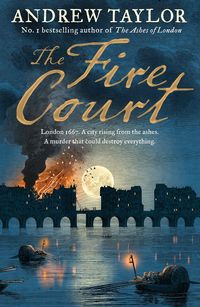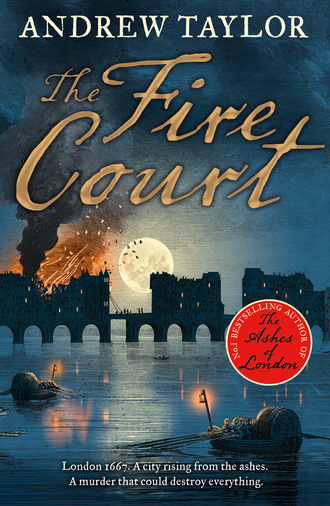
Полная версия
The Fire Court
‘My lady?’ Mary said on Monday afternoon. ‘We need to change the sheets.’
She opened her eyes and saw Mary standing over her with an armful of bedlinen. She allowed herself to be helped out of bed and placed in an armchair by the window. It was a fresh, clear afternoon. Her bedchamber was at the back of the house. The trees at the bottom of the garden shielded the brick wall behind them and the fields stretching up to Piccadilly.
The window was open, and she heard hooves, hammering and sometimes distant voices. The trees blocked out most of the view, but occasionally she glimpsed a flash of colour through the leaves or wisps of smoke, rising higher into the empty sky until they dissipated themselves in the empty blue of heaven.
If one went to heaven after death, Jemima thought, how eternally tedious it would be if it were nothing but blue and infinitely empty. Better to be nothing at all oneself. Which was blasphemy.
Philip came up to see her while she was sitting there.
‘Madam,’ he said, bowing. ‘I’m rejoiced to see you out of your bed at last.’
He glanced at the maids, who had continued at their work but were making themselves as unobtrusive as possible, as servants should. ‘Mary says you remember nothing of your – your illness.’
‘No, sir.’ She and Mary had agreed it was wiser this way, wiser to bide one’s time. ‘I had pains in my head when I woke up.’
‘The doctor called it a sudden inflammation of the brain. Thanks to his treatment, it came and went like an April shower. Can you remember how it happened?’
‘No. It is all a perfect blank to me until I woke up in my bed.’
‘You and Mary went out for a drive in a hackney coach,’ he said slowly, as if teaching a child a lesson. ‘After you’d dined – on Thursday. Remember?’
‘No.’
‘The fever came on suddenly. You were insensible, or very near to it, when Mary brought you home.’
‘I remember nothing,’ she said, though she remembered everything that mattered. She remembered every inch of the way to Clifford’s Inn, every step up the stairs of Staircase XIV. For now, however, it was better to pretend to forget.
Philip’s hand touched her arm. ‘The doctor said that sometimes sufferers are much troubled by dreams when the fever is at its height, and believe all sorts of strange fancies. But thank God all that is passed now.’
‘I am much better, sir,’ she said. ‘I feel quite refreshed.’
‘Good. In that case, will you join me at supper?’
‘I think not. I will take something here instead.’
Jemima watched him as she spoke, but his expression told her nothing. Her husband was tall, lean and dark-complexioned – like the King himself. He was not a handsome man but usually she found his face good to look at, because it was his. But now his face had become a mere arrangement of features, an array of hollows, projections, planes, textures, colours. He was a stranger to her.
A familiar stranger. A treacherous stranger, and that was the very worst sort of stranger.
‘Tomorrow, then,’ he said, smiling. ‘For dinner. We shall have guests, by the way – a brace of lawyers. One of them’s Sir Thomas Twisden, the judge.’
It seemed to her that he spoke more deliberately than usual, enunciating the words with precision as if they were especially significant. He paused – only for a second, but she knew that the pause meant something, too. He knew that she didn’t like people to come to the house.
The maids had finished making the bed. Hester left the room, her arms full of dirty linen. Mary remained, tidying the pots and bottles on the dressing table.
‘And I’ve asked Lucius Gromwell to join us,’ Philip said.
Jemima caught her breath, and hoped he hadn’t noticed. Gromwell, of all people. The sly, twice-damned, whoreson devil. How dared they? She stared at her lap. She sensed he was looking at her, gauging her reaction to Gromwell’s name. She was aware as well that, on the very edge of her range of vision, Mary’s hands were no longer moving among the litter on the dressing table.
‘It will be good to have you at the table,’ he went on. ‘You must make sure they send up something worth eating. We must do our best to keep Sir Thomas amused. We want him to look kindly on us, after all, don’t we?’
His voice sharpened towards the end, and she looked up. He wants me to twitch like a hound bitch, she thought, to the sound of her master’s voice.
‘Yes, sir,’ she said.
‘He’s a Fire Court judge,’ Philip reminded her. ‘He’s down for the Dragon Yard case.’
He smiled at her and made his way towards the door. He paused, his hand on the latch.
‘Lucius is writing a book, by the way. He is mad for it. It’s called The Natural Curiosities of Gloucestershire, and it will have many plates and maps, so it will cost a great deal to produce. I promised him I would pay for the publication, and he assures me it will make me a handsome profit when the edition sells out, as well as enshrine my name for posterity.’
Gromwell, she thought. I hate him.
‘You remember him, don’t you? My old friend from school and Oxford.’
She nodded. Gromwell will look at me tomorrow and know my shame, she thought, and I shall look at him and know that he knows it. He arranged it all. None of this would have happened without him. Gromwell, who dared to stand in my way at Clifford’s Inn.
‘Poor Lucius, eh?’ Her husband lifted the latch and laughed with what seemed like genuine amusement. ‘I doubt he’ll ever finish the book. He is a man of many parts but he finishes nothing he begins. He was like that at school, and he’s never changed.’
CHAPTER FOUR
My father had been run over in Fleet Street by a wagon bearing rubble removed from the ruins of St Paul’s Cathedral. The weight had broken his spine, killing him instantly. It was a miracle that the pressure had not cut him in half.
Infirmary Close was full of wailing women. Margaret persuaded herself that his death had been her fault, for she had left him in the parlour while she was making dinner, believing he was no longer capable of managing the locks and bolts of the door into the lane. The neighbours’ maids wept in sympathy. The laundry woman came to the house to collect the washing; she wept too, because tears are catching and death is frightening.
After he brought me home in the hackney coach, Sam went into the kitchen yard and chopped wood as if he were chopping down his enemies: one by one, with deliberation and satisfaction.
As for me, I went into my father’s bedchamber and sat beside him, as I should have done last night. He lay with his eyes closed and his hands folded over his chest. Someone had covered the great wound with a sheet and bound up his jaw. His face appeared unmarked. Sometimes the dead look peaceful. He did not.
I could not pray. I did not weep. The weight of his disapproval bore down on me, for I had strayed from the godly path he had ordained for me, and now it could never be put right. Worse still was the shame I felt about how I had behaved to him and how I had felt about him during the last few months, when he had become as vulnerable as a child.
Something shifted inside me, as an earthquake ripples and rumbles through solid earth and rock, bringing floods and ruin in its wake. Nothing would be the same again.
That was when the memory of Catherine Lovett came into my mind. She was a young woman with a strange and independent cast of mind. I had done her a service at the time of the Fire, though I had not seen her since; she was living in retirement and under an assumed name. As it happened, I had been with her when her father died, and I had seen what she had done. She had taken his hand and raised it to her lips.
I looked at my father’s hand. Flesh, skin and bone. The fingers twisted like roots. The nails discoloured and in need of trimming. Death had robbed his hand of its familiarity and made it strange.
I lifted the hand and kissed it. The weight of it took me by surprise. The dead are heavier than the living.
‘I am truly sorry for your loss,’ Mr Williamson said the following morning.
I thanked him and requested leave of absence to bury my father and settle his affairs.
‘Of course.’ Williamson turned away and busied himself with the papers on his desk. ‘Where will you lay him to rest?’
‘Bunhill Fields, sir.’
Williamson grunted. ‘Not an Anglican burial ground?’
‘I think not. He would not have wished it.’
Bunhill Fields was where the Dissenters lay, and where my father belonged. Williamson returned to reading letters, occasionally annotating them. The two of us were alone in the Scotland Yard office, which lay just to the north of the Whitehall Palace itself. Williamson had two offices, one close to my Lord Arlington’s, and this one, which he used for the Gazette and for other concerns that required more privacy.
A few minutes later, he spoke again, and his voice sounded harder than before, closer to his northern roots, which was often a sign of irritation in him. ‘You must look to the living, Marwood, as well as the dead.’
‘Yes, sir.’
‘You would not wish anything to reflect ill on this office. Nor would I.’
I bowed my head. I knew what Williamson intended me to understand. Before his mind lost its bearings, my father, Nathaniel Marwood, had been a Fifth Monarchist. As a result of his allegiance to that dangerous sect, he had been imprisoned for treason. He had considered the Church of England as the next best thing to the Church of Rome with its Papist ways and its foul plots against honest men. He had hated all kings except King Jesus, whose coming he had devoutly waited for.
‘After all,’ Williamson said, staring grimly at me, ‘you would not want to lie in Bunhill Fields yourself when your time comes. At least, I hope you would not.’
‘Of course not, sir.’
Nowadays I served the King; and it was politic for me to have a care for what I did and said, and to choose wisely whom I associated with. I made sure the world knew that I went to church regularly and that I took communion when it was fitting to do so, according to the rites of the Established Church and the instruction of its bishops. But there was always the danger that, through my father, I might be considered guilty by association, by blood.
‘So you will change your mind, Marwood? No doubt your father would have wished you to think of your best interests in these changed times.’
‘Yes, sir. But I must also think of his.’
Williamson gave a laugh – short, sharp and mirthless, like the bark of a dog. ‘You’re obstinate in your folly.’ He lowered his head over his papers. ‘Like father, like son, I suppose.’
For some reason, that last remark comforted me as nothing else did.
Two days later, on Monday, we laid Nathaniel Marwood in his grave. There was no reason for delay – the death had been an accident; it was easy enough for an old man to stagger on the crowded pavement and fall under the wagon. He had been notably infirm in mind, if not in body, and quite possibly did not even know where he was. Such deaths happen every day.
We took the body to Bunhill Fields. Apart from the minister, the bearers and the diggers, the only mourners were Sam and myself. Margaret was debarred by her sex from coming, which was unkind, for her grief was in its way deeper and truer than my own. She still wept for my father at the slightest provocation, despite the fact that in life he had been a burden to her.
After the interment, Sam and I took a hackney coach around the walls of the ruined city, a wasteland of blackened chimney stacks, roofless churches and sodden ashes. I told the driver to set us down in Fleet Street. We went to the Devil, the big tavern between Temple Bar and Middle Temple Gate, where Sam stuffed himself with as much as he could eat and I made myself swiftly and relentlessly drunk.
Memory is a strange thing, fickle and misleading, as treacherous as water. My memories of the rest of the day are like broken glass – jumbled, largely meaningless and with sharp edges liable to wound. But I remember perfectly one snatch of conversation between us, partly because it happened early on, and partly because of what was said.
‘Do you know the crossing-sweeper here, master?’
I was too busy drinking to reply.
‘He knows you,’ Sam went on.
‘Do I?’ Of course I gave the sweeper a penny occasionally. If you used a crossing regularly, you would be a fool not to. But I could not for the life of me remember what the man looked like.
‘His name’s Bartholomew,’ Sam said. ‘Like the prophet. Barty.’
I was not attending to what he was saying. I was trying to attract the attention of the waiter and order more wine.
‘He’s the one who brought your father home. The day before he died.’
I forgot the waiter and looked at Sam. ‘Yes – I remember. Margaret told me. I should give him something for his trouble.’
Sam touched the side of his head with his forefinger. ‘Barty said he didn’t know the old man’s wits were wandering. Not at first. I mean, seeing him from the outside, who would? He didn’t look as if he had an addled brain.’
It was a fair point. Nathaniel Marwood had looked what he was – an old man in his sixties, but hale enough. It was only if you tried to talk to him, and you heard the nonsense that poured out of his mouth, making little more sense than the babble of an infant, that you realized his infirmity.
‘There’s an archway up beyond the church, sir. Barty said that was the way your father came.’
‘An archway?’ I thought he meant the great gateway that divided the City from Westminster, and Fleet Street from the Strand. ‘You mean he came through Temple Bar?’
‘No, no. This archway’s off the street. To the north, by St Dunstan-in-the-West.’ Sam leaned forward. ‘It’s the way into one of these lawyers’ colleges. Clifford’s Inn.’
Suddenly my father’s words were in my mind. The last words, nearly, that I had heard from him, and possibly the last words that contained some fragmentary elements of lucidity. ‘Where the lawyers are. Those creatures of the devil.’ He had hated and feared lawyers since they helped to put him in prison and take away his property.
‘Isn’t that where the Fire Court is sitting? Why would he go there?’
Sam shrugged.
Have you ever remarked how lawyers are like rooks? They cling together and go caw-caw-caw … And they go to hell when they die.
So there had been, after all, a single fragment of fact among my father’s ramblings, buried in all the nonsense about my mother. He had been to Clifford’s Inn, among the lawyers.
‘Did Barty say more?’
‘He was weeping,’ Sam said. ‘Barty told me that. So he walked him home, but he couldn’t make head nor sense of what your father was saying.’
I hammered my fist on the table. ‘Then I shall go to Clifford’s Inn and find out.’
The waiter mistook the gesture and was at my elbow in a trice. ‘Beg pardon, master, didn’t mean to keep you waiting. Another quart of sack, is it? You will have it directly.’
‘Yes,’ I said, frowning at him. ‘Very well, a drink before we go, to godspeed us and drink to my father’s memory.’ I glared at Sam. ‘He should not have been weeping. He should not have been unhappy.’
Sam stared at the table. ‘No, sir.’
‘And why in God’s name did he go to Clifford’s Inn? Did someone drag him there?’ All my guilt, all my sorrow, had at last found an outlet. ‘I shall have the truth of it, do you hear, and I shall have it now. Find me this Barty and I shall question him.’
‘Yes, sir,’ Sam said.
There was the waiter again, back already. Before I was an hour older, I was too drunk to have the truth of anything.
CHAPTER FIVE
The day after the funeral I woke with a headache that cut my skull in two.
My mouth tasted as it had in the first few weeks after the Great Fire when everything had turned to ashes, from the air we breathed to the water we drank. Every breath and every mouthful was a reminder of what had happened. Every footstep raised a grey cloud that powdered our clothes and our hair. The destruction of a city and the death of an old man tasted the same: ashes to ashes.
It was early. I wrapped myself in my gown and went down to the kitchen, tottering like an old man myself: in fact just as my father used to do when his limbs were stiff after sleep. Death, I think, must have a sense of humour.
The kitchen was at the back of the house, a gloomy room partly lit by a leaded casement which looked over the graveyard. Margaret was already there. She had lit the fire and was busying herself with the preparations for dinner. She took one look at me, pointed at the bench by the table and went into the pantry.
The kitchen smelled of smoke and old meat. Now I was here, I wanted to leave, but I lacked the strength. In a moment Margaret returned with a jug of small beer and a pot to put it in. Without speaking, she poured a morning draught and handed it to me.
The first mouthful made me retch. I fought back the rising nausea and took a second mouthful. I kept that down and ventured cautiously on a third.
‘I put juice of the cabbage in there too,’ Margaret said. ‘A sovereign remedy.’
I retched again. She went back to stirring the pot over the fire, the source of another smell. I watched a rat skim along the bottom of the wall from the larder and slip through the crack below the back door. I lacked the energy to throw something at it.
Taking my time, I drank the rest of the pot and let it settle. I felt no worse for it. At least my mouth was less dry.
Margaret refilled the pot without my asking. Sam had a tendency to take too much drink, and she knew how to deal with it.
I closed my eyes. When I next opened them, Margaret was standing over me. She was a short, sturdy woman with black hair, dark eyes and a high colour. When hot or angry, she looked as if she might explode. She looked like that now but I wasn’t sure why. My memory of the later part of yesterday was blurred. Clearly, I had been very drunk. That probably meant that Sam had been very drunk too.
‘Master,’ she said. ‘Can I speak to you?’
‘Later,’ I said.
She ignored that. ‘Your father’s clothes, sir. I—’
‘Give them to the poor,’ I croaked. ‘Sell them. I don’t care a fig what you do with them.’
‘It’s not that, sir. I tried to clean his coat yesterday. The one he was wearing.’
I winced and looked away, reaching for the pot.
‘It’s a good coat,’ she said. ‘There’s a deal of use left in it.’
‘Then get rid of it somehow. Don’t bother me with it, woman.’
‘I emptied the pockets.’
Something in her voice made me look up. ‘What is it?’
For answer, she went to the shelves on the wall opposite the fireplace and took down a small box without a lid. She set it on the table.
Inside was my father’s frayed purse and a piece of rag. The purse contained two pennies – we had never given him more because his money tended to be stolen or lost, if he had not given it away first – and four pieces of type, the only surviving relics of his press in Pater Noster Row. His folding knife was there too, with its handle of wood, worn and stained with constant use. At the bottom was a crumpled sheet of paper, smeared with rust.
Not rust, of course. Dried blood. Just as there had been dried blood on the cuff of his shirt.
Yesterday’s conversation with Sam flooded into my mind. The crossing-sweeper. Clifford’s Inn. Where the lawyers are. Those creatures of the devil. And, before that, my father talking deluded nonsense about my mother, and the woman on the couch, and closing her eyes.
I picked up the paper and smoothed it out. It was a strip torn from a larger sheet. Written on it were the words ‘Twisden, Wyndham, Rainsford, DY’.
Margaret refilled my pot. ‘It wasn’t there last week, master.’
‘Are you sure?’
She ignored the question, treating it with the contempt it deserved.
My brain was still fighting yesterday’s fumes. I screwed up my eyes and tried to focus on the words. First, the three names. Then two initials. DY – a name so well known that initials sufficed for it?
‘Bring me a roll and some butter.’
She went away. I sat there, staring into nothing. Clifford’s Inn. A scrap of paper stained with blood. A few names. It unsettled me that my father’s ramblings had contained a grain of sense. He really had strayed into a place of lawyers. But he could have picked the paper up anywhere.
The door from the yard opened and closed. There were footsteps in the scullery passage, and the tap of a crutch on the flagged floor.
Sam appeared in the kitchen doorway. He jerked his head towards the scullery passage and the back door. ‘Barty’s in the yard.’
I stared at him.
‘He won’t get any scraps out of me at this hour,’ Margaret said tartly. ‘Tell him to come back after dinner.’
‘Hold your tongue, woman.’ Sam looked at me. ‘Barty, master. The crossing-sweeper who saw your father. You told me to find him for you. Do you remember? In the Devil?’
Suddenly I was sober, or I felt I was. I stood up, knocking over the bench. ‘Bring him in.’
‘Best that you go out to him, master.’ Margaret wrinkled her nose. ‘If you’d be so kind. He stinks.’
‘You’ll give him something to eat,’ I said. ‘Take it out to him.’
‘Something you should know, sir,’ Sam said. ‘Barty says he saw your father again.’
‘What the devil are you talking about?’
Sam’s voice was gentle. ‘On Friday morning. As well as on Thursday.’
There was a moment of silence. My mouth was open. Margaret stood with a pan in her hand, leaning forward to put it on the fire, as still as a statue.
I swallowed. I said slowly, ‘Last Friday, you mean? The day my father died?’
Sam nodded.
‘Did he see what happened?’
‘He’ll only speak to you. I’m no use to him. You’re the one with the purse.’
Margaret whimpered softly. She set the pan on the fire.
‘Why didn’t he tell us sooner?’
‘He was taken up for debt that very afternoon. It’s only yesterday evening his mother raised the money to get him out of prison.’
Sam hopped down the passage and into the yard. I followed. Over his shoulder, I saw the crossing-sweeper sitting on the side of the trough that caught the rainwater. He was huddled in a filthy cloak with his hat drawn low over his ears. He was a crooked man with a sallow countenance.
When he saw us, he sprang up and executed a clumsy bow. Then he shrank back into his cloak as if he wanted to make himself as small as possible.
‘Sam says you saw my father on the day he died,’ I said. ‘As well as the day before, when you brought him back here.’
Barty nodded so violently that his hat fell off, exposing a bald patch covered in scabs, below which a fringe of greasy hair straggled towards his shoulders. He licked his lips. ‘You won’t make me go before a justice, master? Please, sir.’
‘Not if you tell me the truth.’
‘I done nothing wrong.’ He looked from me to Sam with the eyes of a dog that fears a beating.
‘Tell me,’ I said. ‘You won’t be the poorer for it.’
‘It was like Thursday, master. He came out of Clifford’s Inn again, down to Fleet Street. He was in a terrible hurry, and he knocked against a bookstall there, and the bookseller swore at him …’
Sam nudged him with his elbow. ‘Tell his honour the rest.’
Barty screwed up his face. ‘He was looking back over his shoulder. As if someone was chasing him.’
‘What?’ I snapped. ‘Who?’
‘Couldn’t see, sir. There was a wagon coming down from St Paul’s, and a coach coming the other way, under the Bar. But I thought I’d go over and give the old fellow a helping hand, like I done the other day.’
‘Hoping it would be worth your while,’ Sam said. ‘You don’t have to tell us all that. Go on.’


